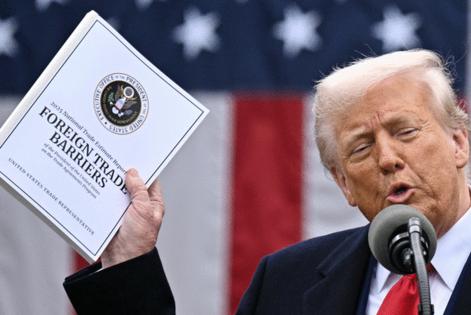Commentary: President Donald Trump's tariffs will cost us
Published in Political News
As President Donald Trump laid out his case for sweeping new tariffs, it sounded reasonable. He was only imposing on other countries the burden they impose on us. Those tariffs, he said, would boost our national revenue and decrease our deficit. He recalled a wealthy America 150 years ago funded entirely by tariffs instead of a pesky income tax, and he longed to make the rest of the world fund our national budget again.
Trump bemoaned how the United States subsidized other countries to the tune of hundreds of billions of dollars because we buy more goods from them than they do from us. The tariffs, he said, would drive manufacturing and production back home and increase the goods we sell around the world.
These tariffs include a minimum 10% on all imported goods, and what he called “reciprocal” tariffs on dozens of other U.S. trade partners, including an additional 34% tariff on goods from China, 32% on Taiwan and 24% on Japan.
The problem with the case he presented is that none of it is true. His “reciprocal” tariff numbers don’t match other countries’ tariffs but are derived instead from each country’s trade surplus with us. Trump’s “reciprocal” tariff against the European Union is 20%, for example, although the average EU tariff on U.S. goods is less than 3%. That won’t stop our trade partners from making these exorbitant numbers real, however, when many inevitably respond with matching tariff hikes in return.
Trump’s claim that these trade surpluses are subsidies is also baseless. Every dollar spent in those markets is a choice we make and benefit from, and we are still the world’s wealthiest economy, even if that is not driven by material exports.
Trump’s tariff income will not make us wealthier either because those tariffs are a tax on us. The costs aren’t absorbed by foreign countries or manufacturers that give up their profit margin. They will be paid by U.S. businesses and consumers instead.
Trump claims the trade-off will be in long-term benefits as the tariffs encourage companies to bring manufacturing and production back to America. But even if so, that shift will take years and, given our relative labor costs, much of what we produce will still likely cost more than the alternatives, so Americans can’t expect prices to decline then either.
We live in a world today very unlike that of the 19th century America that Trump glorifies. In our globalized world, even American-made goods are composed of component parts from dozens of countries. Farmers across the Midwest who rely heavily on inputs, such as potash and other fertilizers from Mexico and Canada, will see production costs increase, while export markets dry up due to retaliatory tariffs on our goods. Our access to off-season fruits and vegetables depends on international trade. So does our access to less expensive clothing and electronics. Some commodities will become scarce because it isn’t commercially viable to either build or grow them at home or to bring them in.
You can certainly begrudge trade agreements like the North American Free Trade Agreement that gutted American manufacturing by giving U.S. businesses and consumers easy access to lower prices and labor. Or unfair trade practices such as China’s currency manipulation that has long helped China secure trade surpluses around the world. Or lower regulatory standards elsewhere that make it cheaper to produce these goods.
But Trump does Americans a disservice by pretending this can all be undone overnight, or that the American people even want that. The predictable result of Trump’s tariffs will be higher costs for American businesses and consumers, fewer export markets, a global economic slowdown and a disadvantaged place in the global economy. Is it worth that for a more self-sufficient, but poorer, America?
We can’t expect other countries to make up the difference either, as we take an adversarial posture toward our integrated global economy. Instead of looking to appease Trump’s demands, they’re now looking to replace us. Canada has tired of trying to negotiate and is settling instead into boycotts and “Buy Canada” campaigns. The European Union has vowed to retaliate. Our close allies South Korea and Japan joined China, our greatest adversary, in their first economic dialogue in five years, as they all look to strengthen their resilience against Trump’s pressure campaign. China and Brazil, South America’s biggest economy, already struck a deal to trade in their own currencies instead of the U.S. dollar. These tariffs will inevitably drive other countries to consider the same. If we are not dependable trading partners, our partners will stop depending on us, which will cost us too.
As our businesses and consumers suffer the consequences, the global economy’s role in our prosperity will become impossible to ignore. But it may be too late to roll this back by the time we all realize it.
____
Elizabeth Shackelford is senior policy director at Dartmouth College’s Dickey Center for International Understanding and a foreign affairs columnist for the Chicago Tribune. She was previously a U.S. diplomat and is the author of“The Dissent Channel: American Diplomacy in a Dishonest Age.”
___
©2025 Chicago Tribune. Visit at chicagotribune.com. Distributed by Tribune Content Agency, LLC.




























































Comments